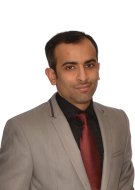
In this interview we found out more about Momen Almomen who specialises in paediatric neuromuscular disorders in Dammam, Kingdom of Saudi Arabia.

Affiliation: King Fahd Specialist Hospital-Dammam
Position: Paediatric Neurologist/Neuromuscular specialist
What education and training did you have to arrive at your current position?
After finishing high school in the Eastern Province of Saudi Arabia, I enrolled in the college of Medicine, University of Dammam. After graduation, I joined the child neurology residency program at the University of Calgary, Alberta, Canada. This was followed by a neuromuscular fellowship and a neuromuscular pathology/gene therapy training at the University of Iowa and Nationwide Children’s Hospital/ Ohio State University, respectively. Then, I returned to my home country to start my practice in my hometown.
What led you to follow a career in the field of Myology in particular?
Since I was a medical student, I was fascinated with genetic underpinning of human diseases. Following my clinical rotation in general paediatrics, I fell in love with childhood diseases and has seen few patients with neurogenetic diseases. This has inspired me to choose child neurology. During my residency in Canada, I became fascinated with childhood muscle diseases such as Duchenne Muscular Dystrophy and metabolic myopathies and decided to subspecialize in this field.
What is your current research/ clinical interest in Myology?
My currents interest lies in studying the genetic variants of muscle diseases in the region, with main interest in muscular dystrophies. I want to better characterize the phenotypes of muscle diseases in my region and highlight the phenotypic and genotypic differences in the region compared to the other parts of the world.
Why are you passionate about developing a neuromuscular centre in your geographical area?
Due to the high rates of consanguinity in the middle east region, the number of the autosomal-inherited genetic diseases is staggering. This provides an opportunity for me to develop a program/centre that serves the needs of the patients which includes diagnosis, counselling, and treatment (if available) in a multi-disciplinary fashion.
What is the nature of the work you are involved in your geographical area?
In my practice, I see patients referred from different cities from the Eastern province mainly as well as patients referred from the other provinces. We are working on developing local registries of the genetic muscle and nerve diseases in our centre.
Would you please introduce your fellow doctors in your geographical area?
I live and practice in Dammam, Kingdom of Saudi Arabia. It is located in the eastern part of the Arabian Peninsula and is well-known for its beautiful coastlines on the gulf.
What are the regional challenges from the point of view of local doctors in the field of myology?
We typically have issues with local physicians’ and general practitioners’ knowledge about neuromuscular diseases which, sometimes, might lead to a delay in referring the patients to our centre. This is particularly important in the context of diseases like Spinal Muscular Atrophy (SMA), where early treatment can make a huge impact on outcome. I am lucky to practice in a centre, where such expensive treatments are available for our vulnerable patient population.
How does your work help patients in this region?
I have just joined the department few months ago and I am in the process of establishing a network of experts locally and internationally to better characterize neuromuscular diseases in the region. We are also considering doing outreach clinics in other hospitals, where neuromuscular services are not available.
What do you love most about working in your geographical area?
What I love most is my ability to communicate with local people in their own language and explain diseases to them in an-easy-to-understand terms. The availability of the Internet has made it easier for patients and families to find information online; making our job different as we are expected to address some of the misconception found on social media and on the Web.
How do you see networking as a way to empower Myologists?
I definitely believe in the value of building a network of physicians, physiotherapists, and basic scientists; who are all working towards a common goal of helping patients with rare neuromuscular diseases. Due to the rare nature of muscle diseases, collecting cases from collaborators from all over the world would definitely help push the field forward.
What inspires you to continue working in your geographical area?
What Inspires me the most is the desire to help our vulnerable patient population and their need for a comprehensive, multi-disciplinary approach. Also, the progress in the therapeutics arena gives me and my patients hope for a better future.
What is one unique fact about you that many other people do not know?
What people don’t know much about me is that I am an avid soccer player. Unfortunately, I have not had the chance to play a lot during my training in North America. I am trying to get back in shape since I returned to my home country.
How (can) being part of the WMS community encourage you and help your work?
By establishing a network of like-minded experts in the region, we will be able to collect cases and better characterize the diseases that are more prevalent in the region. Most of my neuromuscular experts in the region have trained in North America; which makes it easier for us to collaborate in projects.